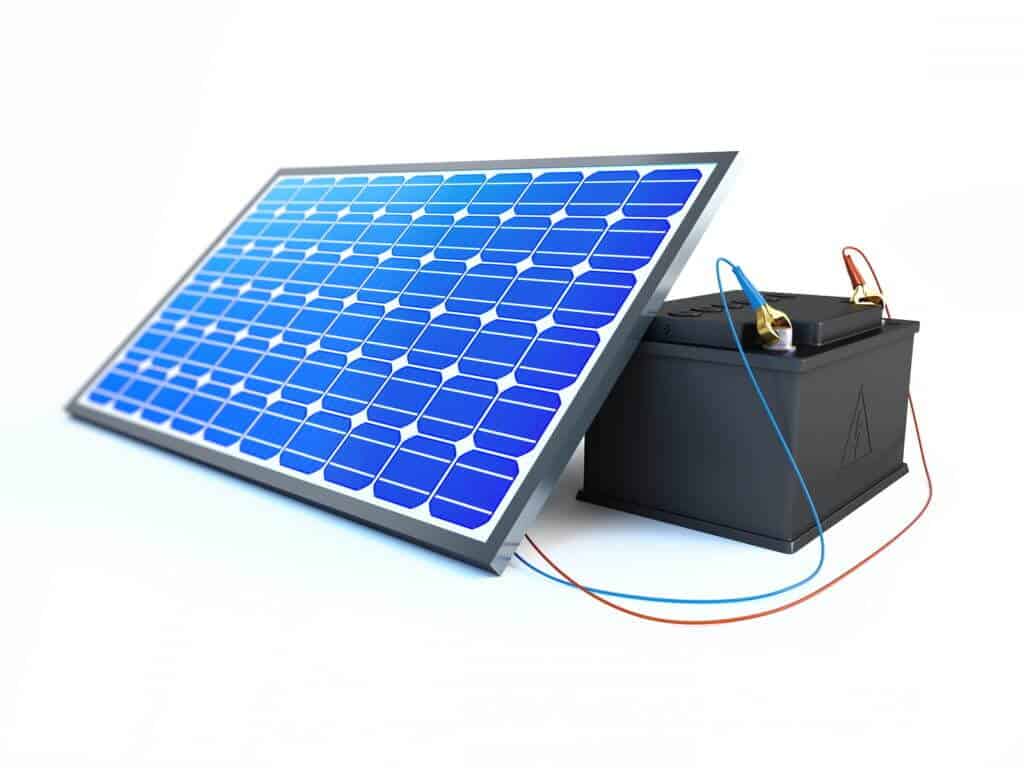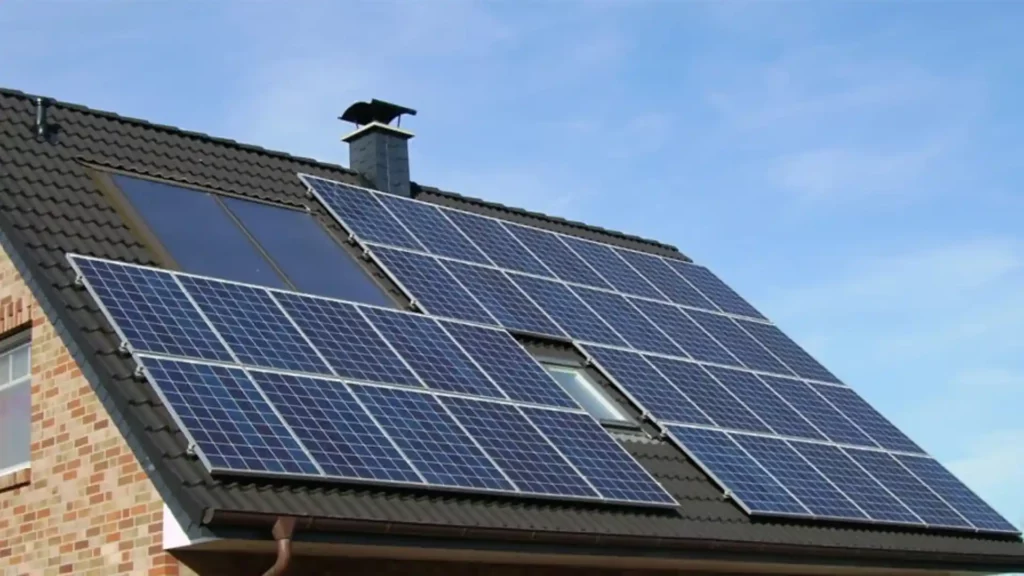As I learn about solar energy I asked myself “Do You Need Batteries for Solar Panels”, I'm considering the need for batteries in my solar system, especially for backup power during outages. Living in an area with frequent power interruptions, having a reliable source of electricity is crucial.
In this personal exploration, I aim to uncover the necessity and advantages of incorporating batteries into my solar panel setup. By understanding how solar energy storage works and the role of solar batteries, I hope to make an informed decision that aligns with my desire for a dependable backup power solution.
Throughout this guide, I will delve into the intricate workings of solar energy storage, shed light on the advantages and drawbacks of integrating batteries with solar panels, and consider the various factors that come into play when making this important decision.
Join me on this journey as we explore the world of solar batteries and determine whether they are the missing piece in achieving reliable backup power during outages.
Understanding Solar Energy
Solar panels, or photovoltaic panels, convert sunlight into electricity. This process is known as the photovoltaic effect. The energy produced can be used instantly, but what happens to the excess power, or during times when the sun isn't shining?
Traditionally, a grid-tied solar system would feed the surplus power back into the electrical grid, allowing for net metering or the sale of excess power back to the utility company. At night or on cloudy days, when your panels aren't producing power, you would draw electricity from the grid.
But what if you want to be entirely energy independent, or what if you live in a location with no access to the grid? This is where solar batteries come into the picture.
See Also Our Post on Eco Friendly Energy Sources
What is a Solar Battery?
A solar battery is a device that stores the energy generated by your solar panels. During the day, when your panels are producing more energy than you need, the excess power is stored in the battery. When the sun isn't shining or during power outages, you can draw energy from the battery, ensuring a constant supply of electricity.
Solar batteries have different capacities and can store varying amounts of energy. The capacity you need depends on your energy usage and the size of your solar panel system.

Why You Might Need Batteries for Your Solar Panels
The choice to integrate a solar battery into your solar power setup is not one to be taken lightly. It primarily depends on your particular energy requirements and circumstances. There are several compelling reasons that might sway you towards considering this addition:
Achieving Energy Autonomy
One of the primary advantages of having a solar battery is the prospect of gaining energy independence. A solar battery provides the unique capability to store surplus solar energy generated during peak sunlight hours. Instead of feeding this excess energy back into the grid, it is conserved for later use. This setup significantly reduces your reliance on the conventional grid, offering a more self-sufficient and sustainable energy solution. It also gives you control over your own energy production and consumption, thereby encouraging a more environmentally-conscious lifestyle.
Check out our post on How Batteries work
Reliable Backup during Power Outages
Power outages can occur due to various reasons such as adverse weather conditions, maintenance issues, or other unexpected disruptions. When such situations arise, a solar battery backup system can become an invaluable asset. It can seamlessly power your home until your regular electricity supply is restored, ensuring that your daily routine is not adversely affected. This can be particularly crucial for homes that depend on electricity for essential services such as medical equipment.
Potential for Reduced Electricity Bills
With the rising cost of electricity, conserving energy and reducing power bills have become significant concerns for many households. A solar battery can be a viable solution in this regard. By storing excess solar energy, you can tap into this reserve during peak usage times or when electricity rates are at their highest under time-of-use tariff plans. By minimizing your consumption of grid power during these periods, you can substantially lower your electricity expenses in the long run.
Provision of Off-Grid Power
For homes located in remote or rural areas where the power grid may not be accessible or reliable, solar batteries are not just an option but a necessity. They can store the abundant solar energy generated during the day for use at night or during cloudy weather, ensuring a consistent and reliable power supply. This can eliminate the need for expensive and often unreliable alternatives such as diesel generators, providing a more sustainable and cost-effective solution.
How to use Solar Panel Directly Without Battery
Using solar panels directly without batteries is a viable option for certain applications where energy storage is not necessary or where grid connection is readily available. Here's how you can utilize solar panels without the need for batteries:
Direct Consumption
The simplest way to use solar panels without batteries is to consume the energy they generate directly as it is produced. Solar panels generate electricity when exposed to sunlight, which can be immediately used to power electrical devices or appliances in your home or business. This approach is effective during daylight hours when solar energy production is at its peak. By connecting your solar panels directly to your electrical system, you can offset your electricity consumption from the grid and rely on the solar energy being produced in real-time.
Grid Connection
Another method is to connect your solar panel system to the electrical grid. This setup is known as a grid-tied or grid-connected system. In this configuration, any excess electricity generated by your solar panels is fed back into the grid, and you receive credits or compensation for the surplus energy exported. During periods when your solar panels are not producing enough electricity, such as at night or on cloudy days, you can draw power from the grid as usual. This way, you can benefit from solar energy while still having a reliable power supply from the grid when needed.
Using solar panels directly without batteries can be a practical and cost-effective solution when your energy consumption aligns with the sunlight hours and you have access to the electrical grid for uninterrupted power supply. It's important to consult with a professional solar installer to ensure the proper installation and connection of your solar panels to your electrical system or grid.

Types of Solar Batteries
Solar batteries come in a multitude of types, each possessing unique characteristics, advantages, and limitations. Here, we will dive deeper into the details of three major categories of solar batteries: Lead-Acid, Lithium-Ion, and Saltwater batteries.
Lead-Acid Batteries
Originating from a technology that's been in use for well over a century, lead-acid batteries are the traditional and most common type of battery used in various applications, including solar power systems. Their enduring popularity stems from their affordability and compatibility with a broad range of systems. However, these batteries carry certain disadvantages, the most prominent of which is their shorter lifespan relative to other battery types. Furthermore, they possess a lower energy density, meaning they require more physical space to store the same amount of energy compared to other battery types. Their performance can also degrade significantly over time, particularly if not maintained properly.
Lithium-Ion Batteries
Representing a more recent development in battery technology, lithium-ion batteries have swiftly become a preferred choice for solar energy storage due to their superior performance characteristics. They boast a higher energy density, allowing for compact designs that can store more energy within a smaller space. Their lifespan significantly outlasts that of lead-acid batteries, often delivering reliable performance for over a decade. While their upfront cost is higher, their extended lifespan and superior performance often translate into better value over the long term. It's also worth noting that lithium-ion batteries require minimal maintenance, which further adds to their convenience.
Saltwater Batteries
Emerging as a novel innovation in the field of energy storage, saltwater batteries use a saline solution as an electrolyte. This unique design approach contributes to several key advantages. Firstly, they are environmentally friendly, making disposal and recycling less problematic than traditional battery types. They also tend to have a long lifespan, comparable to that of lithium-ion batteries. However, saltwater batteries are not as efficient at storing energy, and their initial costs are typically higher than both lead-acid and lithium-ion batteries. Despite these drawbacks, their eco-friendly credentials make them an appealing option for those prioritizing sustainability.
Pros and Cons Of Solar Battery Storage
Like any technology, solar batteries come with their unique set of benefits and drawbacks. It's essential to understand these to make an informed decision about whether or not to include a battery storage system in your solar setup.
Pros of Solar Batteries:
- Increased Energy Independence: One of the most significant advantages of using solar batteries is the enhanced energy autonomy they offer. By storing excess energy generated by your solar panels, you can reduce your dependence on the traditional power grid. This means you have control over your power supply and are less vulnerable to fluctuating energy prices or supply disruptions.
- Reliable Power Supply During Outages: Solar batteries provide a critical power backup during blackouts. While a solar panel system without a battery would stop supplying power during an outage (as it's typically tied to the grid), a system with a battery can continue powering your home using the stored energy, providing peace of mind and convenience.
- Potential for Savings on Electricity Bills: By storing surplus energy for later use, a solar battery system allows you to make full use of your solar panels' output. This stored power can be used during peak utility rate periods or at night, potentially leading to significant savings on your electricity bill over time.
- Environmentally Friendly: Solar batteries, used in conjunction with solar panels, contribute to reducing the carbon footprint by maximizing the use of clean, renewable solar energy. This helps to lessen our reliance on fossil fuels and reduce greenhouse gas emissions.
- Load Shifting: Solar batteries enable a technique called load shifting. By storing surplus energy produced during off-peak times and using it during peak demand times, you can balance your energy consumption and potentially save costs.
- Resale Value: Homes equipped with solar power systems, particularly those with solar battery storage, are often more appealing to potential buyers, possibly enhancing your home's resale value.
Cons of Solar Batteries:
- High Initial Investment: Solar batteries usually come with a high upfront cost. This cost includes not only the battery itself but also associated hardware and the cost of installation. However, it's crucial to consider the long-term savings and benefits when evaluating this investment.
- Replacement Costs: Depending on the type of battery you choose, you may need to factor in replacement costs over the life of your solar power system. For instance, while modern lithium-ion batteries have a relatively long lifespan, other types of batteries may need replacement more frequently.
- Not a One-Size-Fits-All Solution: Solar batteries come in various types, sizes, and capacities, and not all of them are suitable for every solar panel system or every user's needs. It's crucial to work with a knowledgeable installer to select the right battery for your unique setup and energy consumption habits.
Cost of Solar Batteries
The cost of a solar battery depends on its capacity, lifespan, brand, and the technology used. As of this writing, a typical residential solar battery can range from $5,000 to $7,000, excluding installation costs. While this might seem like a hefty investment, remember to consider the long-term savings and the benefits of energy independence.
Choosing the Right Solar Battery
When it comes to choosing a solar battery, several crucial factors must be taken into consideration to ensure optimal performance and suitability for your specific requirements. Here are the key aspects to keep in mind during the selection process:
Capacity & Power
Assess your energy consumption patterns and determine the capacity and power requirements of your solar battery. Consider the average daily energy consumption of your household and the peak power demands. Choose a battery with sufficient capacity to store the excess energy generated by your solar panels and deliver the necessary power when required.
Depth of Discharge (DoD)
The depth of discharge refers to the amount of a battery's capacity that can be utilized before recharging. Some batteries are designed with limitations on how much they can be discharged without sustaining damage. Opt for a solar battery with a higher DoD, allowing you to utilize a larger portion of its capacity and maximize energy usage.
Warranty
Look for a solar battery that offers a warranty that aligns with its expected lifespan. Reputable manufacturers typically provide warranties ranging from 10 to 15 years, ensuring coverage during the battery's most critical operating years. A solid warranty gives you peace of mind and protection against potential defects or premature failure.
Manufacturer
Choose a solar battery from a reputable and well-established manufacturer. Research the manufacturer's track record, customer reviews, and industry reputation. A trusted manufacturer is more likely to deliver reliable products that meet or exceed performance expectations.
Installation Considerations
Determine whether the solar battery requires professional installation or if it's suitable for a do-it-yourself (DIY) project. Some batteries may have specific installation requirements, safety considerations, or integration complexities that necessitate professional expertise. Ensure that you have a clear understanding of the installation process and any associated costs before making your decision.
Frequently Asked Questions
- Can Solar Panels Run Without Battery?
Yes, solar panels can run without a battery. When you have solar panels without a battery, the electricity they produce is either used immediately in your home or sent back to the electrical grid. However, without a battery, you cannot store energy for use when the sun isn't shining, like at night or during cloudy days. - Do I Really Need a Battery for Solar Panels?
Whether you need a battery depends on your specific circumstances and goals. If you want to ensure power availability during outages or when solar production is low, a battery can be very useful. However, if your main goal is to reduce electricity costs and your area has a reliable grid, you might not need a battery, especially if net metering is available. - Do Solar Panels Require a Battery?
Solar panels do not require a battery to function. They can be connected directly to the electrical grid (grid-tied systems) or to your home for immediate use of the electricity they produce. Batteries are optional and are typically used for energy storage to provide power when the solar panels aren’t producing electricity. - How Much Does a Solar Battery Cost for a House?
The cost of a solar battery for a house varies widely depending on the type, capacity, and brand of the battery. As of my last update in January 2024, prices can range from a few thousand dollars to over ten thousand dollars. Factors like the size of your solar panel system, your energy storage needs, and the specific technology of the battery (like lithium-ion vs. lead-acid) will affect the cost. - Is Solar Battery Backup Worth It?
Whether a solar battery backup is worth it depends on several factors:- Reliability of Grid: If you experience frequent power outages, a battery can offer significant value.
- Electricity Rates and Policies: In areas with high electricity rates or without favorable net metering policies, a battery can help maximize savings.
- Solar Incentives: Some regions offer incentives or tax credits for installing energy storage, which can make a battery more cost-effective.
- Personal Preferences: Environmental considerations or a desire for energy independence can also influence the decision.
Each situation is unique, so it's important to evaluate these factors based on your specific circumstances and goals.
Conclusion
In conclusion, the decision to incorporate batteries into your solar panel system is a personal one, influenced by various factors and considerations. As you embark on this exploration, it's crucial to evaluate your specific energy needs, circumstances, and priorities to determine whether solar batteries are the missing piece in achieving reliable backup power during outages.
By integrating a solar battery into your setup, you can attain greater energy autonomy, reducing your reliance on the conventional grid and embracing a more sustainable lifestyle. The ability to store surplus solar energy generated during peak sunlight hours empowers you to have control over your energy production and consumption, fostering a sense of independence and environmental consciousness.
Moreover, solar batteries offer a reliable backup solution during power outages, ensuring that your essential services are not disrupted and your daily routine remains unaffected. For areas prone to blackouts or homes requiring uninterrupted power for medical equipment, a solar battery backup system can be an invaluable asset.
Sources
- https://www.energy.gov/energysaver/benefits-residential-solar-electricity
- https://www.energysage.com/shop/home-solar/
- https://www.consumeraffairs.com/solar-energy/how-much-do-solar-panels-cost.html
- https://www.solar.com/learn/can-i-use-solar-panels-without-a-battery/

